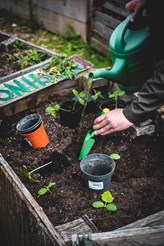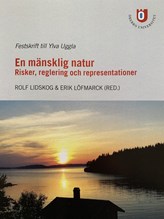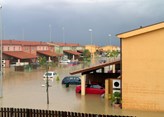News for CESSS
-
Research funding received for sociological projects on transformative change
Riksbankens Jubileumsfond (RJ) annually announces funding for senior lecturers and professors with the aim to complete research that has already reached an advanced stage. This year, Rolf Lidskog, professor in sociology at Örebro University and member in...
-
Understanding transformative societal change towards a sustainable future

In their special report on global warming of 1.5°C (SR15), the Intergovernmental Panel on Climate Change (IPCC) states that rapid transformational change is needed to reach the global temperature targets of the Paris Agreement. But what does...
-
Transformative learning through prefiguring sustainable futures?

Trying to make climate-friendly food choices in a not-so-sustainable society can be a difficult task. What conflicts do young people who swim against the current face in their everyday lives and how do they cope with these? How can such prefigurative...
-
Sustainable lifestyles as a positive consequence of the COVID-19 pandemic?

The COVID-19 pandemic disrupted many aspects of global society and forced people to cope with the various negative consequences brought upon them. At the same time, this disruption presented a window of opportunity for transformative change, giving...
-
A Human Nature: Risks, Regulations, and Representations

A festschrift titled En mänsklig natur: risker, reglering och representationer was published on the occasion of the CESSS member Ylva Uggla’s retirement. The book, edited by Rolf Lidskog and Erik Löfmarck, contains twelve chapters written by Uggla’s...
-
What influences sustainable consumption among youths?

Consumption of sustainable food is crucial for climate change mitigation and requires the involvement of people of all ages, in particular young people. In an article recently published in the International Journal of Environmental Research and Public...
-
Preparing for Climate Change: How do municipalities divide responsibility between themselves and individual citizens?

As climate change continues to cause adverse effects globally, it becomes increasingly important for individual and societal actors alike to prepare for potential climate crises to minimize their impact. Climate crisis preparedness in Sweden is largely...
-
Climate-friendly food choices among late adolescents: Facing border tensions as a path to transformational change?

How should everyday pro-environmental behaviors such as climate-friendly food choices be looked upon in the context of transformational change: As something that hides the need for structural change, or as a starting point for a profound transformation?...
-
Special call collection in the journal Sustainability
A special call collection Urban Renewal, Governance and Sustainable Development: More of the Same or New Paths? is now completed and published in the journal Sustainability. It includes eight contributions and one brief Editorial. Guest editor for the...
-
How should ‘traditional ecological knowledge’ be used in environmental science?

Concepts such as ‘traditional ecological knowledge’, ‘indigenous and local knowledge’ and ‘local environmental knowledge’ (summarised as TEK), have become increasingly popular among environmental scientists. But is this usage entirely unproblematic?
